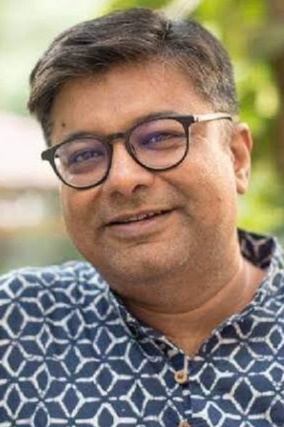In an exclusive chat with The Pioneer, the popular screenwriter and lyricist Niren Bhatt discusses his formative journey, working on projects like Taarak Mehta Ka Ooltah Chashmah and movies like Stree and Bhediya. He also discusses his prowess in the field!
Aarti Sreenath
Niren Bhatt’s remarkable journey from a celebrated Gujarati playwright to a leading screenwriter in mainstream cinema is defined by versatility and innovation. Known for his work on hit films like Munjya, Bala, Made in China, Wrong Side Raju, Stree 2 and Bhediya, he has seamlessly transitioned from the world of theatre to the silver screen. His writing portfolio also includes the popular TV show Taarak Mehta Ka Ooltah Chashmah, which played a pivotal role in establishing him as a prominent name in the industry. His ability to blend humour, social commentary and engaging narratives has made him a sought-after talent across multiple mediums, including television, OTT, and films. His love for storytelling began in childhood.
“I started writing my first play when I was in standard three,” he recalls. His passion for the craft continued throughout his school and college years, where he was recognised with College Youth Festival Awards, State Awards and even National Awards for his work in theater. However, his initial career path was far removed from writing. “I worked in the corporate world briefly, but I knew my heart wasn’t in it. Writing was my true calling.”
In 2007, he took a crucial step by relocating to Mumbai to seek out writing possibilities. It wasn’t long before he found success with the immensely popular television show Taarak Mehta Ka Ooltah Chashmah, which gave him the financial stability to focus on more creative projects. “That show was a turning point,” he admits. “It gave me the freedom to experiment with other formats like films and music albums.”
Balanced creativity with structure across different mediums has been one of his strengths. He believes that you need to understand the mediums very carefully. “Television and OTT platforms are more about character development, while cinema focuses on plot and visuals. Writing for each requires a different approach. With OTT, you get more freedom. A series allows you to explore characters in much greater depth—over 400 to 500 minutes compared to the 120 minutes you get in films.”
His versatility is evident in his projects like Bala and Made in China, where he deftly blends humor with social messages. “Cinema is a medium to engage and entertain people. If you want to convey a social message, it should be subtle and woven into the story rather than preached directly,” he notes.
Discussing the art of writing sequels, he further goes on to reflect on the challenges involved: “Writing a sequel is tricky because you need to understand what made the original successful while also adding something fresh. For 3-2, I studied successful sequels and incorporated elements that stayed true to the essence of the original but enhanced the film.”
Going ahead, working on films like Stree brought its own unique set of challenges, particularly in terms of the shooting conditions. “The first schedule was shot during the monsoons and we faced heavy rains and illnesses among the crew. The second schedule in winter was better, but the cold was brutal, especially during the shoot of the Aaj Ki Raat song.”
When asked about his unique blend of comedy and horror in Stree, he explains, “Fear and humour complement each other well. When someone is scared, their reactions can be quite funny. It’s all about creating situations where the two can intersect naturally.”
Collaboration with actors like Rajkummar Rao, Shraddha Kapoor and Varun Dhawan has been one of the highlights of his career. The dedication these actors show, he says, is incredible. For example: “During the shoot of Bala, we were filming in Delhi under sweltering heat and high pollution levels. Our actors had to endure the discomfort of wearing wigs and heavy costumes for long hours, yet they never complained. Varun shot in the freezing jungles of Arunachal Pradesh, dealing with leeches and other challenges, but his commitment never wavered.”
For aspiring writers, he offers sound advice: “Draw inspiration from life, not just from films. The more experiences you have, the better writer you’ll become. Cinema reflects real life, so it’s important to observe people, their behaviour and emotions. That’s where the best stories come from. Immerse yourself in a variety of literature—novels, comics, Pulpy novels, graphic novels and cultural texts. This exposure will enrich your creativity and storytelling abilities.” He believes one needs to read to write better!
Looking ahead, he hints at exciting projects in the pipeline. “We’re working on expanding the cinematic universe we’ve been building. One of the upcoming projects is a vampire-themed film, tentatively titled Thama. It will mostly feature Ayushmann Khurrana and will be a significant addition to our universe. There are many films and a couple of OTT shows also,” he confirms.
Niren Bhatt’s journey is one of creativity, resilience and a deep commitment to the art of storytelling. From the stage to the screen, his ability to adapt and innovate continues to captivate audiences and there’s no doubt that his future projects will be just as compelling as his past work.




